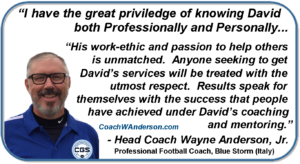Here's how to choose the best executive coach for your goals.
By Amy Vetter, Entrepreneur, national speaker, CPA (Twitter @AmyVetterCPA
Behind every great athlete there is an even greater coach. There isn't a top athlete--from Muhammad Ali to Tiger Woods to Serena Williams--who did not need a mentor to help them reach the top of their profession.
If you think about it, your business is similar to that of an elite athlete. You may have the drive, the skills, and the vision, but there are times when you need professional guidance to ensure you stay on the right path, and how to best utilize your talents and work on your shortcomings in order to reach your goals. An executive coach can be that person.
No matter where you are on your career path--from eager up-and-coming manager to a seasoned senior executive to an entrepreneur--there will be times when you can benefit from some professional coaching.
I hired an executive coach midway in my career when I had sold my accounting practice and was trying to figure out where to go from there. It was easy to fall back into what I had done before, but I felt at the time that I needed an independent perspective from someone who didn't know me and could give me some ideas on my next steps
An executive coach can offer many benefits, according to Randy Walton, social entrepreneur with The Walton Group. They can be a mentor and motivator, independent observer who keeps you on track, or a safe place to get feedback on your specific habits or work issues that get in the way of success.
But first, you have to find the right coach for your needs. There are many types of executive coaches out there, but finding one with the right personality and experience is important.
Asking friends, family, and other entrepreneurs if they have had success with a coach is always the best place to begin. Here are four other tips to help you find the perfect match:
1. Gauge your chemistry.
During your initial meeting or phone call, pay attention to the chemistry between you and the coach. Do you like the person's energy and experience? You should ask them about what works and doesn't work in a coaching relationship to gauge if that will work for you.
Also ask them for examples of outcomes they have had with other clients. You should feel excited and inspired by the discussion, but a bit nervous about the upcoming challenge.
2. Find someone with the background you need.
You want a coach who is at least familiar with your industry or has worked with other clients like you. You will need to do some soul searching prior to meeting with a potential coach so you ask the right questions in order for him or her to fill the gaps you need.
A good executive coach doesn't need to have the same exact background or experience as you, but a familiarity will help him or her better understand your thinking and needs. More importantly, your coach needs skills you either do not have and want to attain, or ones that can help strengthen your opportunity areas.
3. Make sure you understand the coach's area of expertise.
Many coaches have a specialty in helping improve certain skill sets or to support clients during specific transitions like when you move to a new department or take on new responsibilities. Depending on your needs, you may benefit from someone with specific know-how.
4. Ask how the coaching process works.
A skilled coach should walk you through his or her process so you have a clear idea of what to expect and how it helps reach your goals. In my career, I have utilized coaches either to guide me career-wise, or to help me be more successful in my current role as well as serve as an independent sounding board.
The coaching process should include helping you define your core challenges and how they fit with your ultimate objective. The coach should also describe exactly how you will learn your new skills and behavior, what you will gain, and best of all how they transfer back to your work.
You do not need to go it alone as you navigate through your career or business. You will always face new challenges and setbacks that you can't figure out on your own and need someone you can ask or bounce ideas off of. You may know where you want to go, and perhaps even have a good idea on how to get there, but a professional coach can offer the untarnished insight, feedback, and guidance you need to become a star player.
For full article go to inc.com. PUBLISHED ON: DEC 8, 2017















